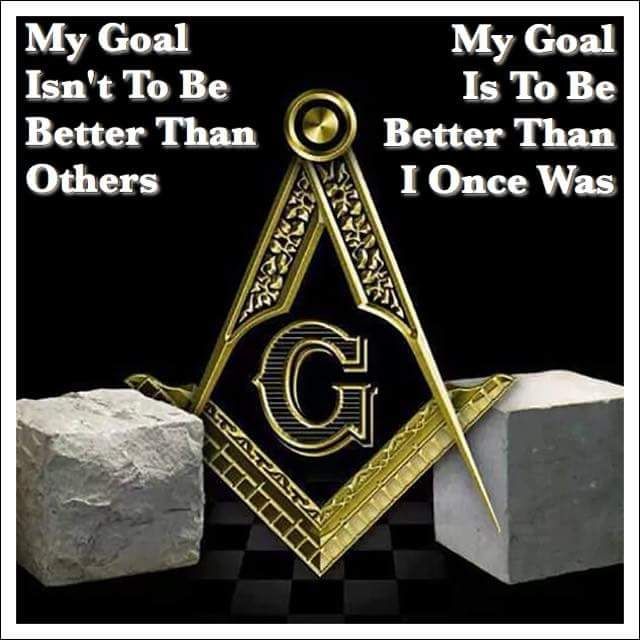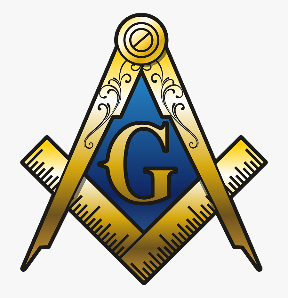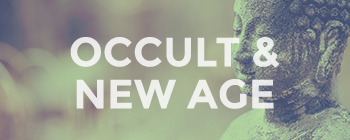Is Freemasonry a secret society, or a society with secrets?
A Freemason recently invited me to a something called a ‘white table meeting’. This is a meeting where Masons can invite non-Masons along to learn more about Freemasonry. He reasoned that my attendance would help me better understand what actually happens in the Masonic Lodge.
Freemasons say that the purpose of these gatherings is ‘to avoid misunderstandings’ and to ‘reduce ill-informed comments’ from those who, like me, speak about this group
Should I go along? Would I leave with a very different view of freemasonry? Is Freemasonry a secret society (my view) or a society with secrets (their view)? Let’s consider where Freemasonry originates and what it teaches.
What is Freemasonry?
According to the website of the United Grand Lodge of England, Freemasonry is:
One of the oldest social and charitable organisations in the world, Freemasonry’s roots lie in the traditions of the medieval stonemasons who built our cathedrals and castles.
In the medieval era, stonemasons often travelled around to find work in different locations. To demonstrate their level of qualification, they would use grips, words and signs in order to distinguish themselves from unqualified builders.
Freemasonry uses building analogies to teach members how to lead productive lives that benefit the communities that they live in.
In the medieval era, stonemasons wore aprons and gloves to protect themselves while working on shaping rough pieces of stone, but in today’s society Freemasons meet to build friendships and communities rather than cathedrals and castles.
In the medieval era all Masons would have been ‘operative’ that is, they were practised and skilled in the craft of stonemasonry. Today, the masons that gather in a lodge are not ‘operative’ but ‘speculative’, that is they no longer practice the literal work of a stonemason, but rather masonry has now been imbued with symbolism and allegory.

The tools once used by operative Masons to shape and knock off the rough edges of stone, are now used symbolically by speculative masons to shape and knock of the rough edges of men. For what reason? They say so men may become better, more outstanding, more impressive, more moral, members of their society.
To this end, the United Grand Lodge of England1 explains that Freemasonry is built upon four principles: Integrity, Friendship, Respect and Charity. These four principles seek to build in four ways:
Building good people
Freemasons are focused on building themselves as people of integrity, and membership provides the structure to help achieve that goal. Being a Freemason gives members a sense of purpose, supporting and guiding them on their journey through life. Collectively, members are bonded through an understanding of unity and equitability – principles fundamental to Freemasonry.
Building together
Freemasonry provides the common foundation for friendships between members, many of which will last for life. Being a Freemason means something different to each person who joins, but whether looking to make acquaintances or develop their own potential, all members share a sense of togetherness that strengthens their ability to succeed and grow.
Building unity
Freemasonry brings people together irrespective of their race, religion, or other perceived differences that can divide us as a society. Members are expected to be of high moral standing and are encouraged to talk openly about what the organisation does and what it means to be part of it.
Building compassion
Kindness and charitable giving are deeply ingrained within the principles of Freemasonry and the organisation provides the structure for members to make positive contributions to their communities and various causes through fundraising events or volunteer work. Individuals can make an important contribution at local, national and global level by giving both their time and money.
Good or Bad?
Publicly, Freemasonry polarises opinion. It is either viewed as a benign and benevolent men’s society, (which the United Grand Lodge statement appears to validate), or it is seen as a sinister secret society that controls and directs world affairs (a view popularised by Dan Brown novels like The Da Vinci Code and The Lost Symbol). Which is it? I’m of the view that it is not either/or but rather both/and.
It appears to me that to many of their members Freemasonry is just as the United Grand Lodge describes. Such men would admit that there are some secret and even strange elements to it, but it is not harming anyone and, if it helps men be better husbands, fathers, workers etc. then it should be applauded. Also, look at its charitable work. It gives millions to charity each year.
This is the public face of freemasonry and the perhaps the experience of many Masons content not to move further up the degrees. But what of the testimonies of those who went further and learned more?2 What of those who claim that Freemasonry is totally incompatible with Christian belief and practice?
When Freemasonry is compared with the historic teachings of Christianity, it must be seen as totally irreconcilable. Before I show why, let me deal with an oft heard objection: But freemasonry is not a religion.
Is Freemasonry a Religion?
This is an important question that strikes right at the heart of the issue. If Freemasonry isn’t a religion, what harm is there in a Christian, or a person from any religion joining them? Many Freemasons claim that they are not a religion:
It is often asked “Is Freemasonry A Religion”. The answer is simple, and disappointing to some. No, Freemasonry is not a religion. Freemasonry does have spiritual aspects including biblical symbolism that originates from the symbolism used to build cathedrals in the middle ages, but it is not in fact a religion. (Is Freemasonry A Religion? | The Freemasons)
Yet Freemasonry has all the signs of being a religion. Note the following:
Freemasonry…
has a building where the faithful gather.
has ‘religious-type’ garments.
has prayers and its own hymns.
has a Holy Book in each lodge, the type of which is dependent on its locality.
insists upon belief in a God and encourages worship to your God.
has Chaplains, Deacons, Wardens, a Worship Master, an Organist, liturgy, and an altar.
has initiation and burial rites.
With this in mind, let us consider what this so-called ‘non-religion’ teaches.
The G is for…
The universal symbol of Freemasonry is a set square and compass.

The Square is a working tool of a mason in constructing churches and cathedrals during the middle ages. In Freemasonry, it symbolizes morality; symbol of righteousness. It keeps us in touch with God. To square our actions. A Compass symbolizes Spirituality. To circumscribe our desires and keep our passions within due bounds.3
Occasionally, at the centre of the square and compass you will see the letter ‘G’. What does the ‘G’ stand for? Well, depending on how far you go within Masonry, your answer may be different.
To the initiate into the craft the G stands for God. The first charge given to any prospective Mason is this:
‘A Mason is obliged, by his tenure, to obey the moral law; and if he rightly understand the art he will never be a stupid atheist nor an irreligious libertine…. Let a man’s religion or mode of worship be what it may, he is not excluded from the order, provided he believe in the glorious architect of heaven and earth ….’4
A Mason cannot be a ‘stupid atheist nor a religious libertine’ he must believe there is a God, but who or what he believes that God to be matters not. All gods are accepted in the Lodge.
Moving from initiate stage and progressing through the three degrees of Masonry, a Mason will be told that G stands for Geometry.
Geometry is a branch of mathematics, and this was very important to historic Masonry.
One example of Freemasonry influencing mathematics is seen through King Solomon’s Temple located in Jerusalem. The temple was built using measurements that reflected Pythagorean triples (a set of three whole numbers), this discovery was later named “Solomon’s triangle“.
These sets of numbers were very important at the time because they helped advance geometry by allowing the Stonemasons to design buildings that took into consideration the golden ratio or what is commonly referred to as the divine proportion. The ancient stonemasons’ use of mathematics, specifical geometry, can also be seen in other famous architectural work.5
Later Masons may learn that the G can stand for Gnosis. This is based on the idea that Masonry is a secret society that has secret knowledge. Knowledge is salvation to a Mason. Or perhaps they will hear that G stands for Generative Principle.
Ex-33-degree Mason Jim Shaw explains:
“The Blue Lodge Mason is taught that the “G” in the basic Masonic symbol represents God. Later on, he is told that it represents “deity”. Later still, he is told that it represents “geometry”. In reality, this letter represents the “generative principle,” the Sun-god and, thus, the worshipped phallus, the male “generative principle…” In its position (along with the square and compass) on the east wall over the chair (throne) of the Worshipful Master, it is the representation of the Sun, thus of the Sun-god, Osiris. Its earthly meaning, then, is of the sacred phallus; its cosmic meaning is of the Sun, worshipped since antiquity by pagans while facing the East.’6
Who is the God of Freemasonry?
Freemasons refer to God as G.A.O.T.U. (Great Architect of the Universe). This generic way of referring to God allows each Mason to privately call upon a God of his own choosing.
In his private petitions a man may petition God or Jehovah, Allah or Buddha, Mohammed or Jesus; he may call upon the God of Israel or the First Great Cause. In the Masonic Lodge he hears petition to the Great Architect of the Universe, finding his own deity under that name. A hundred paths may wind upward around a mountain; at the top they meet.7
It is certainly true that all paths lead to God, but not all paths lead to salvation.
For we must all appear before the judgment seat of Christ, so that each one may receive what is due for what he has done in the body, whether good or evil. (2 Corinthians 5:10)
The Bible tells us that there is only one true God:
Thus says the Lord, the King of Israel and his Redeemer, the Lord of hosts: “I am the first and I am the last; besides me there is no god. (Isaiah 44:6)
Jesus the Master Mason?
Though ‘Christian’ Masons (is that an oxymoron?) may pray privately to and give worship to Jesus, this is not permitted in the Lodge. In Freemasonry Jesus is just seen as one of numerous ‘Master Masons’.
The scriptures are full of allegorical references to masonry and building with stone. For example in Mark 12,10, Jesus says, “The stone which the builders rejected is become the head of the corner”. In John 1,42 Jesus makes Simon Peter a stone, a foundation stone of a spiritual Church. The Freemasons likewise labour on the construction of a spiritual version of Solomon’s temple, and not a physical one. In Mark 6,3 Jesus is himself described as Ο τεκτων: this has always been mistranslated as ‘carpenter’ in the English Bible, but its truer meaning is Builder (cf. architect).8
It was after participating in a Masonic Maundy Thursday ‘black communion’ ceremony in his Scottish Rites Temple in Florida, that 33-degree Mason Jim Shaw left Freemasonry. The Participants of this ceremony are required to refer to Jesus as an “apostle of mankind who was neither inspired nor divine”.
Masonry teaches that Jesus was only a man. He was an exemplar, but no greater than others such as Aristotle, Plato, Pythagoras, and Muhammed.
Yet the Bible teaches that Jesus was God:
For in him the whole fullness of deity dwells bodily (Colossians 2:9)
Jesus said to them, “Truly, truly, I say to you, before Abraham was, I am.” (John 8:58)
In the beginning was the Word, and the Word was with God, and the Word was God (John 1:1)
The Bible teaches that there is no other name given by which a man can be saved:
And there is salvation in no one else, for there is no other name under heaven given among men by which we must be saved. (Acts 4:12)
Therefore God has highly exalted him and bestowed on him the name that is above every name, so that at the name of Jesus every knee should bow, in heaven and on earth and under the earth, and every tongue confess that Jesus Christ is Lord, to the glory of God the Father. (Philippians 2:9-11)
The Bible
Though the Bible may be important to Masons who consider themselves ‘Christian’, Masonry sees the Bible to be no more valuable than any other ‘Volume of Sacred Law’. The Bible may be the book on the altar within a lodge in a Christian context, but in an Islamic context it would be the Koran, and a Hindu context the Rig Vedas etc.
Yet the Christian does not accept that all these writing are of equal value. The Bible alone is the Word of God.
All Scripture is breathed out by God and profitable for teaching, for reproof, for correction, and for training in righteousness, that the man of God may be complete, equipped for every good work. (2 Timothy 3:16-17)
Every word of God proves true;he is a shield to those who take refuge in him. (Proverbs 30:5)
And beginning with Moses and all the Prophets, he interpreted to them in all the Scriptures the things concerning himself. (Luke 24:27)
Freemasonry, Human Nature, and Sin
Freemasonry believes that a person may go to heaven as a result of good works, so there is no need for Jesus to die as a payment for personal sin. They believe that man is just imperfect by nature, and through Freemasonry he may be able to improve his character and behaviour. This is done by following the principles taught to them in the three degrees. As they progress from Entered Apprentice to Fellow Craft and finally to Master Mason, men will increase in moral and spiritual perfection.
This is not what the Bible teaches. The Bible teaches that we are sinners:
None is righteous, no, not one;no one understands;no one seeks for God. (Romans 3:10-11)
‘…for all have sinned and fall short of the glory of God.’ (Romans 3:23)
We have all become like one who is unclean, and all our righteous deeds are like a polluted garment. We all fade like a leaf, and our iniquities, like the wind, take us away. (Isaiah 64:6)
Freemasonry and Salvation
As we have seen Freemasonry denies the necessity of Jesus’ death and resurrection as a means of salvation. It teaches that a person can be saved regardless of the religion they practice or the god they worship. Taking the tools of masonry and investing them with salvation, all that needs to be done to be saved is to receive the light offered through Masonic practice.
Conclusion
I’m going to decline the invitation to go along to the Lodge. I do not believe that anything I see or hear there will in anyway convince be that Freemasonry is a benign non-religion. All that it teaches is completely incompatible with historic Biblical Christianity, so Christians should have nothing to do with it.
Take no part in the unfruitful works of darkness, but instead expose them. For it is shameful even to speak of the things that they do in secret. Ephesians 5:11-12
1 https://www.ugle.org.uk/
2 You are a fully-fledged Mason when you have completed the three degrees. But within the York and Scottish Rites you can go much further.
3 https://taughtbydegree.wordpress.com/2016/02/10/square-and-compasses-the-secret-within-the-secret/
4 https://freemasonrymatters.co.uk/knowledge/fundamentals-masonic-funeral-rites/
5 Freemasonry & Mathematics: The Great Mystery
6 Jim Shaw The Deadly Deception, page 144
7 Introduction to Freemasonry p.38
8 Source: MasonicCode.com

